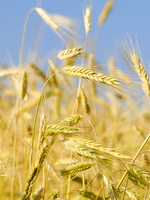- Home
- sprouted spelt flour
Blog Categories
Recent Posts
What is Sprouted Flour?
Posted by on
You’re trying to eat right. Processed foods are on your no-no list, although occasionally you might (guiltily) dig into a chocolate bar in the checkout line. And you took almost all grains out of your diet. But then the word got around about sprouted flour, and your curiosity piqued.
Have you tried it yet?
Sprouted flour is nothing new. It’s been around since we humans first discovered flour. Like organic food, it’s what came before we started messing around with nature. Only in this case, it’s what existed before the Industrial Revolution, as opposed to what existed before we introduced our food to the chemistry lab.
What Our Ancestors Knew About Sprouted Flour
Growing grain is hard work. It takes hours of labor to plow, sow, tend, and reap the harvest. And then you have to store or grind it. Before the modern combine, the harvest alone took days, if not weeks. Ripe grain sat on the stalk, and the germination process began – something that today’s harvesting techniques prevent.
After the harvest was finished and the grain was stored, there was more time for germination to take place. All that was necessary was a little moisture. Sometimes, the grain would even ferment slightly. Something that, once again, doesn’t happen with machine harvesting. Today, most conventional grain is harvested, dried, and ground so quickly that germination and fermentation don’t have the chance to begin.
And THAT is one of the biggest problems with modern grains.

Our ancestors knew about sprouted grain flours – it’s all they had. For thousands of years after the discovery of grains and flour-making, all-purpose flour didn’t exist. Neither did whole wheat. Both of those flours require much faster harvesting and processing than our ancestors were capable of.
But just because it’s what our ancestors ate doesn’t mean it’s better...does it?
Sprouted Flour Health Benefits to Know
If you’re on the Paleo or Primal diet, you may have cut grain out of your food completely. Even many of those who stick with a whole foods and fermented foods diet but haven’t ventured into the fully Primal lifestyle still limit grains. With good reason.
Grain consumption cuts back your ability to absorb nutrients. Studies have shown that enzyme inhibitors and phytic acid – particularly in whole grain flours due to their bran content – cut back on your body’s ability to absorb key nutrients, like zinc, copper, iron, and magnesium. And that leaves your body craving more nutrition (more food), often leading to weight gain.
Sprouted flours contain a significantly lower amount of phytic acid and enzyme inhibitors. As grain begins to germinate on the stalk, the plant sends signals to stop producing them, in order to allow the seed to become a new plant and have access to the delicious nutrients that are stored inside of it. The plant wants the seed to be able to use those nutrients to grow.
Lucky for you, most of the time that means increased bioavailability of key nutrients for humans, too. Sprouted grain includes higher levels of vitamins B2, B5, B6, C, and carotene as well as higher enzyme counts and as a result, it’s easier to digest – even for people with grain intolerances.
Sounds good, right? (Especially if you love baked goods…)
What is the Shelf Life of Sprouted Flour?
Now that you're paying attention, let’s talk about the practical issues. Storage being number one.
We all know that processed flours have a scarily-long shelf life…they seem to keep forever. Sprouted flour is NOT the same, immortal substance. It does, however, have a long shelf-life. If you dry it carefully, store it in an airtight container, and do NOT refrigerate it, your sprouted flour could last as long as 6 months! Freeze it, and the shelf life increases slightly, to a potential 8 month shelf life.
Homemade Sprouted Flour
Practical issue number two: where can you find it?
For a long time, sprouted flour was a cult phenomenon. You couldn’t get it anywhere. You had to buy wheat berries or other grains and rehydrate them until they sprouted, drain them, dry them, mill them, and use the flour…that’s a LONG process. One that many people find intimidating. Sprout too long, and your breads are mush. Sprout too short a time, and you’re eating whole wheat flour…
And then something changed. People with a passion for real food decided to make sprouted flours available for purchase. Essential Eating pioneered a process to make both sprouted spelt flour and sprouted wheat flour, now sold by Shiloh Farms. Essential Eating is one of many companies to offer sprouted snacks – their Sprouted Pretzel Puffs are a hit with most age groups. Sprouted breads and baked goods are also growing easier to find.
Sprouted grain flours are going mainstream.
How to Use Sprouted Grain Flours
Now that you know about sprouted grain flours, you may be wondering how to use them correctly. The answer is easy – the same as you would regular flour. You’ll want to cut back your liquids slightly and try to use fermented milk products instead of water or juices, but otherwise the switch should be easy.
If you use sprouted flour, let us know. We’d love to hear
your experiences with it, and maybe even share a recipe or two here on the
blog!
Image Credits: Graphic Stock
Information provided in this communication is not designed to and does not provide medical advice, professional diagnosis, opinion, treatment or services to you or to any other individual. This is general information for educational purposes only. The information provided is not a substitute for medical or professional care, and you should not use the information in place of a visit, call consultation or the advice of your physician or other healthcare provider. Wise Choice Marketing Inc is not liable or responsible for any advice, course of treatment, diagnosis or any other information, services or product you obtain through Wise Choice Marketing Inc.


 Loading... Please wait...
Loading... Please wait...













